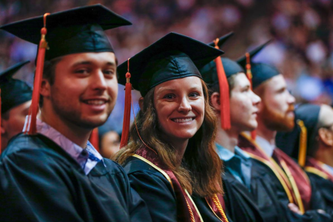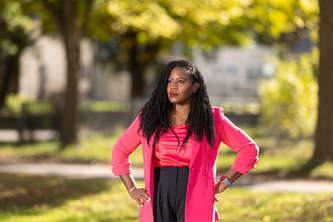With its March meetings hosted at the University of Minnesota Morris — nationally ranked as one of the 50 best liberal arts and sciences universities in the U.S. — the Board of Regents will observe firsthand the impact the Morris campus has on its students, faculty, staff and the broader community.
Board activities on Thurs., March 9 are dedicated to discussions with campus leadership and staff about enrollment, alumni relations, diversity, equity and inclusion programming, finances, facilities and more. The Board will also meet with students, faculty and staff fueling innovation and connections, including a poster presentation highlighting research in psychology, physics, computer science, mathematics and sustainability. Thursday evening will wrap up with a campus reception followed by a dinner with Regents and campus leadership.
The broader Morris community is also invited to meet with Regents on Wed., March 8 when the Board hosts a public reception at the Common Cup Coffeehouse in Morris.
As part of its Friday meeting, the Board will discuss the many positive influences the Morris campus has on its community, the U of M System and the state of Minnesota with Acting Chancellor Janet Schrunk Ericksen. Examples will include leadership in sustainability, inclusion, community partnerships and workforce development, such as:
- Noted campus leadership in building a scalable, sustainable living and learning community is focused on transformative collaborations between the campus and the city of Morris. The Morris Model centers its work on energy conservation, clean energy, community resilience, cultural exchange, and celebration with specific goal areas within clean and efficient energy, transportation, waste reduction and recycling, and education.
- The campus is the only four-year college in the upper Midwest federally designated as a Native American-Serving Non-Tribal Institution. As such, it has highly developed resources and support structures for Native American students, commitments that have contributed to strong community ties and partnerships with Native American communities and other local communities of color, such as the region’s growing Latino community.
- Campus-community collaborations occur regularly through the Clifford J. Benson Center for Community Partnerships, which is devoted to addressing needs in small towns and building more vibrant and equitable rural communities. This work focuses on community-submitted projects that might benefit from coordination support, faculty expertise, and/or student interns.
- The campus has long been a leader in teacher education and developing new, high-impact student pathways for successful careers and graduate and professional education. For example, the Licensed Alcohol and Drug Counseling program has been developed in partnership with Morris psychology faculty and the Fond du Lac Tribal and Community College. It provides access to a mental health career and state licensure while also meeting a growing demand for counselors in Tribal and other rural communities.
While most Board meetings are held at the Twin Cities campus, the Board traditionally visits other U of M campuses for its meetings once each year. This practice was paused during the COVID-19 pandemic, and next week’s full Board meeting will be the first outside the Twin Cities since its March 2020 meetings in Duluth.
Also during its March meetings, the Board is expected to:
- Act on proposed real estate transactions related to the purchase of 748 acres in Mower County to support planning for the Future of Advanced Agricultural Research in Minnesota (FAARM) program.
- Review and act on amendments to the University’s budget request for the 2024-25 biennium, including funding requests related to the UMN Health vision.
- Receive an update from Board Vice Chair Janie Mayeron about the Board’s Diversity, Equity and Inclusion Working Group.
- Receive the annual report of the Student Representatives to the Board of Regents.
- Discuss plans to advance the University’s diversity, inclusion, justice and equity vision in the second in a series of presentations from Vice President for Equity and Diversity Mercedes Ramírez Fernández.
For more information, including future meeting times, visit regents.umn.edu.
- Categories:
- Campus Affairs
- Board of Regents





